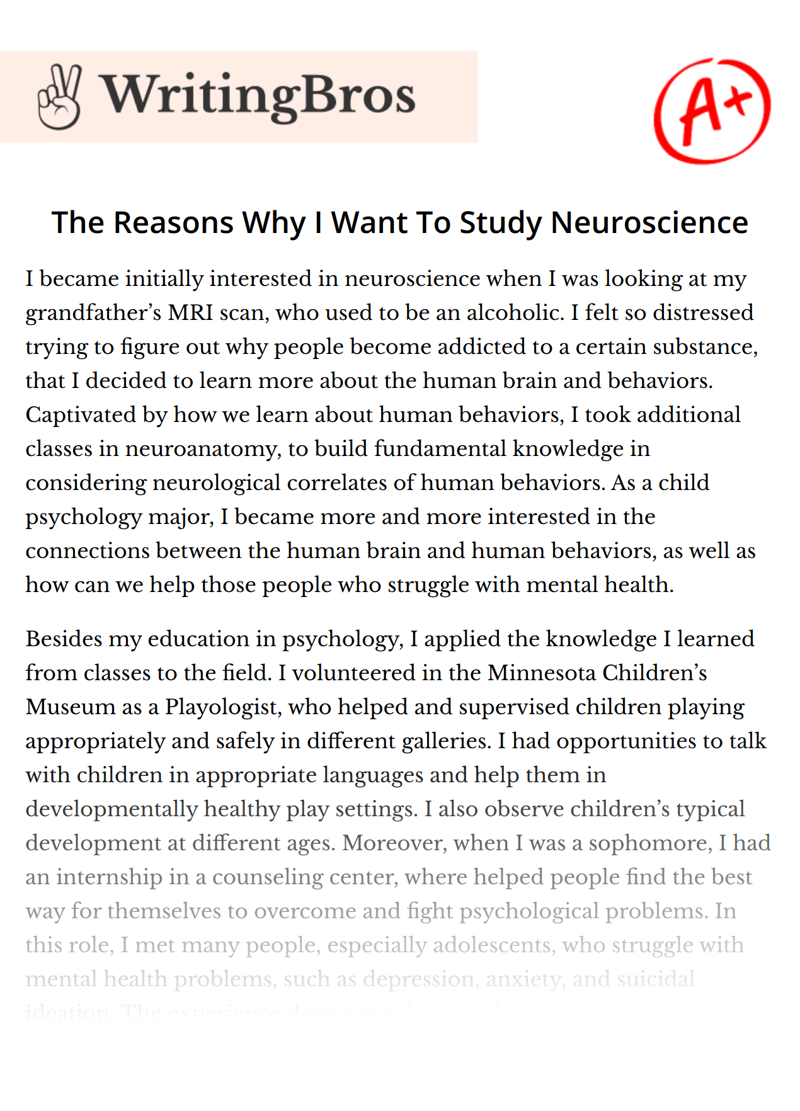The Reasons Why I Want To Study Neuroscience

I became initially interested in neuroscience when I was looking at my grandfather’s MRI scan, who used to be an alcoholic. I felt so distressed trying to figure out why people become addicted to a certain substance, that I decided to learn more about the human brain and behaviors. Captivated by how we learn about human behaviors, I took additional classes in neuroanatomy, to build fundamental knowledge in considering neurological correlates of human behaviors. As a child psychology major, I became more and more interested in the connections between the human brain and human behaviors, as well as how can we help those people who struggle with mental health. This is why neuroscience major seemed like a natural and essential step in my academic journey. This fascination with understanding the intricate workings of the human brain, coupled with a strong desire to contribute to the well-being of individuals facing mental health challenges, is precisely why I decided to pursue a major in neuroscience. It offers me the opportunity to delve deeper into the field and explore innovative ways to support those in need while advancing our understanding of the brain's role in human behavior.
Besides my education in psychology, I applied the knowledge I learned from classes to the field. I volunteered in the Minnesota Children’s Museum as a Playologist, who helped and supervised children playing appropriately and safely in different galleries. I had opportunities to talk with children in appropriate languages and help them in developmentally healthy play settings. I also observe children’s typical development at different ages. Moreover, when I was a sophomore, I had an internship in a counseling center, where helped people find the best way for themselves to overcome and fight psychological problems. In this role, I met many people, especially adolescents, who struggle with mental health problems, such as depression, anxiety, and suicidal ideation. The experience does not only provide real-life normal or atypical development stages for me to reinforce what I learned from the class, but also built my interests in abnormal psychology, how it differs from normal development, and how we can help people who struggle with mental health problems.
Eager to learn more about the science of mental illness, I became interested in research when enrolled in upper-level classes. I had considerable training working as an undergraduate research assistant in two psychology-related research labs. In the Chicago Longitudinal Study, I was required to take an active and responsible role in terms of collecting school data in the Twin Cities area, reading-related research papers, and reporting it to researchers. Working in the Gunnar Lab (The Gunnar Laboratory for Developmental Psychobiology Research) gave me more valuable experience in computer tasking, such as organizing laboratory materials, working with SPSS, and editing and checking data. Thus, these opportunities have prepared me with indispensable experience before attending graduate school.
In addition, I worked as an assistant in the department of psychiatry in a hospital in China. I observed patients who were diagnosed with depression and schizophrenia, and I learned to score certain clinical psychological assessment tests, such as the Hamilton Depression Scale and the Pittsburgh Sleep Quality Index. I also assisted with collecting patient’s MRI and fMRI scans and examining their brain structures to study the different brain structures between individuals with depression and schizophrenia and a control group. The opportunities to learn how to administer new psychological tests, collect neuroimaging data, did not only helped me discover how passionate I am about understanding the biological correlates of mental health problems but also motivated me to learn more before I could reach my goal of being a teacher and researcher; besides to conduct my research in neuropsychology, I also want to improve the awareness of mental health problems among future students.
My coursework, fieldwork, and research experiences to date have clearly led me to be interested in the biological factors underlying human behaviors, including mental health and wellness. I am particularly interested in understanding the biological causes and correlates of psychological problems. I am excited about the potential opportunity to attend UBC’s neuroscience program because I believe the multidisciplinary approach that is emphasized will allow me being able to consider questions in different aspects. I am specifically interested in the research efforts of Dr. Jehannine Austin (the genetics of psychiatric disorders) because her research on psychiatric disorder aligns with my research interests that is to find the reason under psychiatric disorder and apply it to the real world to improve people’s life quality; Dr. Weihong Song (Alzheimer's disease), because I have taken related neuroscience courses talking about dementia pathogenesis, and I have a strong interest in Alzheimer’s disease; and Dr. Kalina Christoff (neuroimaging and cognitive psychology), because I have prior experience in neuroimaging and strong psychology background.
The field of neuroscience has never failed to surprise me; I find it amazing how humans have discovered so much about the relationship between brain structures and functions, and how brain changes are related to mental health, yet there are still more waiting for us to explore. This is why I want to pursue a master’s degree in the neuroscience field to find more answers before attaining my career goal—being a researcher and a teacher, which can also pass knowledge to others and raise their interests in the neuroscience field. I believe our brain is the key factor in understanding our mental health and well-being. To fully understand the interaction between the brain and behavior is complicated and challenging, but I believe neuroscience is a field with tremendous potential that I am ready to immerse myself in.
Cite this Essay
To export a reference to this article please select a referencing style below

